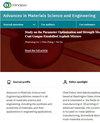Study on the Behavior of Self-Cleaning Impregnated Photocatalyst (Tio2) with Cement Mortar
4区 材料科学
Q2 Engineering
引用次数: 0
Abstract
Cement-based materials are increasingly and widely employed in infrastructure development; however, they pollute our environment by generating carbon dioxide, which is detrimental to our civilization. In self-cleaning concrete, photocatalysts accelerate the decomposition of organic particles; thus, photocatalytic degradation of gaseous pollutants could reduce pollution. The incorporation of photocatalytic components enhanced the mechanical self-cleaning properties of cement mortar. In this study, 4–6 percent by weight of rutile TiO2 was added to mortar, and the results were compared to those of a control sample. On the proposed mortar cubes, both fresh mortar and hardening mortar experiments were conducted. Because the initial and final setting times of TiO2 differ from those of conventional cement mortar, the surplus TiO2water-cement ratio had to be modified. The adaptability of the sol-gel method enables the use of various process parameters to influence the properties of the produced TiO2 nanoparticles. The compressive strength was calculated for 7, 14, 21, and 28 days, and an ultrasonic velocity test was performed after 28 days. On mortar samples, acid and sulfate attack experiments were performed. The M-3 mortar mixture containing 5% rutile exhibited the highest level of strength compared to the other mixtures. The M-3 exhibits a strength that is 10.96% greater than that of the control mix. The impact of acid and sulfate attack on the strength of mix M-2 is relatively modest in comparison to other mixtures. Using RhB (rhodamine color) discoloration under UV light, such as sunlight, the photocatalytic mortar is concentrated; a typical test for self-cleaning cementitious materials reveals the presence of more photocatalytic material, which yields the best results.水泥砂浆浸渍光催化剂(Tio2)自洁性能研究
水泥基材料在基础设施建设中的应用日益广泛;然而,它们通过产生二氧化碳污染我们的环境,这对我们的文明是有害的。在自洁混凝土中,光催化剂加速有机颗粒的分解;因此,光催化降解气态污染物可以减少污染。光催化组分的掺入提高了水泥砂浆的机械自洁性能。在本研究中,按重量4 - 6%的金红石TiO2添加到砂浆中,并将结果与对照样品进行了比较。在提出的砂浆立方体上,进行了新鲜砂浆和硬化砂浆试验。由于TiO2的初凝和终凝时间与常规水泥砂浆不同,因此需要对剩余的TiO2水灰比进行调整。溶胶-凝胶法的适应性使得可以使用不同的工艺参数来影响制备的TiO2纳米颗粒的性能。计算第7、14、21、28天的抗压强度,28天后进行超声测速。对砂浆试样进行了酸、硫酸盐侵蚀试验。与其他混合物相比,含有5%金红石的M-3砂浆混合物表现出最高的强度水平。M-3的强度比对照大10.96%。与其他混合物相比,酸和硫酸盐侵蚀对混合物M-2强度的影响相对较小。利用RhB(罗丹明色)在紫外光(如太阳光)下变色,将光催化砂浆浓缩;自清洁胶凝材料的典型测试表明,存在更多的光催化材料,这产生了最好的结果。
本文章由计算机程序翻译,如有差异,请以英文原文为准。
求助全文
约1分钟内获得全文
求助全文
来源期刊

Advances in Materials Science and Engineering
Materials Science-General Materials Science
CiteScore
3.30
自引率
0.00%
发文量
0
审稿时长
4-8 weeks
期刊介绍:
Advances in Materials Science and Engineering is a broad scope journal that publishes articles in all areas of materials science and engineering including, but not limited to:
-Chemistry and fundamental properties of matter
-Material synthesis, fabrication, manufacture, and processing
-Magnetic, electrical, thermal, and optical properties of materials
-Strength, durability, and mechanical behaviour of materials
-Consideration of materials in structural design, modelling, and engineering
-Green and renewable materials, and consideration of materials’ life cycles
-Materials in specialist applications (such as medicine, energy, aerospace, and nanotechnology)
 求助内容:
求助内容: 应助结果提醒方式:
应助结果提醒方式:


